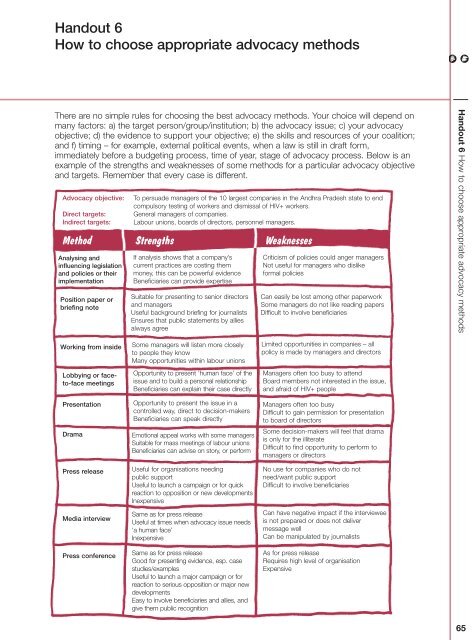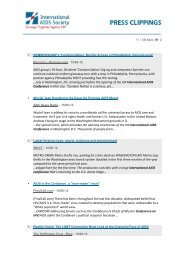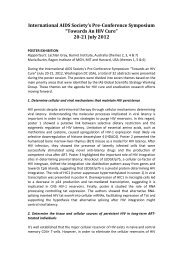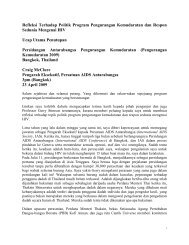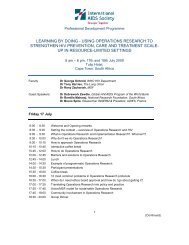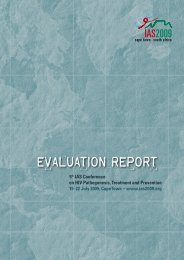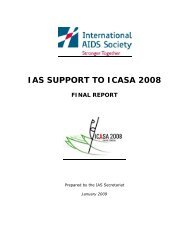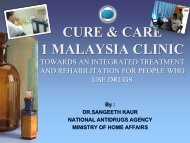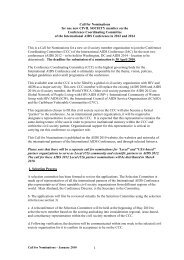Advocacy in Action - International AIDS Society
Advocacy in Action - International AIDS Society
Advocacy in Action - International AIDS Society
Create successful ePaper yourself
Turn your PDF publications into a flip-book with our unique Google optimized e-Paper software.
Handout 6<br />
How to choose appropriate advocacy methods<br />
There are no simple rules for choos<strong>in</strong>g the best advocacy methods. Your choice will depend on<br />
many factors: a) the target person/group/<strong>in</strong>stitution; b) the advocacy issue; c) your advocacy<br />
objective; d) the evidence to support your objective; e) the skills and resources of your coalition;<br />
and f) tim<strong>in</strong>g – for example, external political events, when a law is still <strong>in</strong> draft form,<br />
immediately before a budget<strong>in</strong>g process, time of year, stage of advocacy process. Below is an<br />
example of the strengths and weaknesses of some methods for a particular advocacy objective<br />
and targets. Remember that every case is different.<br />
<strong>Advocacy</strong> objective:<br />
Direct targets:<br />
Indirect targets:<br />
To persuade managers of the 10 largest companies <strong>in</strong> the Andhra Pradesh state to end<br />
compulsory test<strong>in</strong>g of workers and dismissal of HIV+ workers.<br />
General managers of companies.<br />
Labour unions, boards of directors, personnel managers.<br />
Method Strengths Weaknesses<br />
Analys<strong>in</strong>g and<br />
<strong>in</strong>fluenc<strong>in</strong>g legislation<br />
and policies or their<br />
implementation<br />
Position paper or<br />
brief<strong>in</strong>g note<br />
If analysis shows that a company’s<br />
current practices are cost<strong>in</strong>g them<br />
money, this can be powerful evidence<br />
Beneficiaries can provide expertise<br />
Suitable for present<strong>in</strong>g to senior directors<br />
and managers<br />
Useful background brief<strong>in</strong>g for journalists<br />
Ensures that public statements by allies<br />
always agree<br />
Criticism of policies could anger managers<br />
Not useful for managers who dislike<br />
formal policies<br />
Can easily be lost among other paperwork<br />
Some managers do not like read<strong>in</strong>g papers<br />
Difficult to <strong>in</strong>volve beneficiaries<br />
Handout 6 How to choose appropriate advocacy methods<br />
Work<strong>in</strong>g from <strong>in</strong>side<br />
Lobby<strong>in</strong>g or faceto-face<br />
meet<strong>in</strong>gs<br />
Presentation<br />
Drama<br />
Press release<br />
Media <strong>in</strong>terview<br />
Press conference<br />
Some managers will listen more closely<br />
to people they know<br />
Many opportunities with<strong>in</strong> labour unions<br />
Opportunity to present ‘human face’ of the<br />
issue and to build a personal relationship<br />
Beneficiaries can expla<strong>in</strong> their case directly<br />
Opportunity to present the issue <strong>in</strong> a<br />
controlled way, direct to decision-makers<br />
Beneficiaries can speak directly<br />
Emotional appeal works with some managers<br />
Suitable for mass meet<strong>in</strong>gs of labour unions<br />
Beneficiaries can advise on story, or perform<br />
Useful for organisations need<strong>in</strong>g<br />
public support<br />
Useful to launch a campaign or for quick<br />
reaction to opposition or new developments<br />
Inexpensive<br />
Same as for press release<br />
Useful at times when advocacy issue needs<br />
‘a human face’<br />
Inexpensive<br />
Same as for press release<br />
Good for present<strong>in</strong>g evidence, esp. case<br />
studies/examples<br />
Useful to launch a major campaign or for<br />
reaction to serious opposition or major new<br />
developments<br />
Easy to <strong>in</strong>volve beneficiaries and allies, and<br />
give them public recognition<br />
Limited opportunities <strong>in</strong> companies – all<br />
policy is made by managers and directors<br />
Managers often too busy to attend<br />
Board members not <strong>in</strong>terested <strong>in</strong> the issue,<br />
and afraid of HIV+ people<br />
Managers often too busy<br />
Difficult to ga<strong>in</strong> permission for presentation<br />
to board of directors<br />
Some decision-makers will feel that drama<br />
is only for the illiterate<br />
Difficult to f<strong>in</strong>d opportunity to perform to<br />
managers or directors<br />
No use for companies who do not<br />
need/want public support<br />
Difficult to <strong>in</strong>volve beneficiaries<br />
Can have negative impact if the <strong>in</strong>terviewee<br />
is not prepared or does not deliver<br />
message well<br />
Can be manipulated by journalists<br />
As for press release<br />
Requires high level of organisation<br />
Expensive<br />
65


